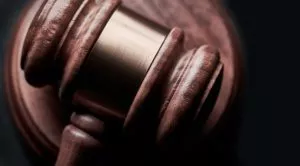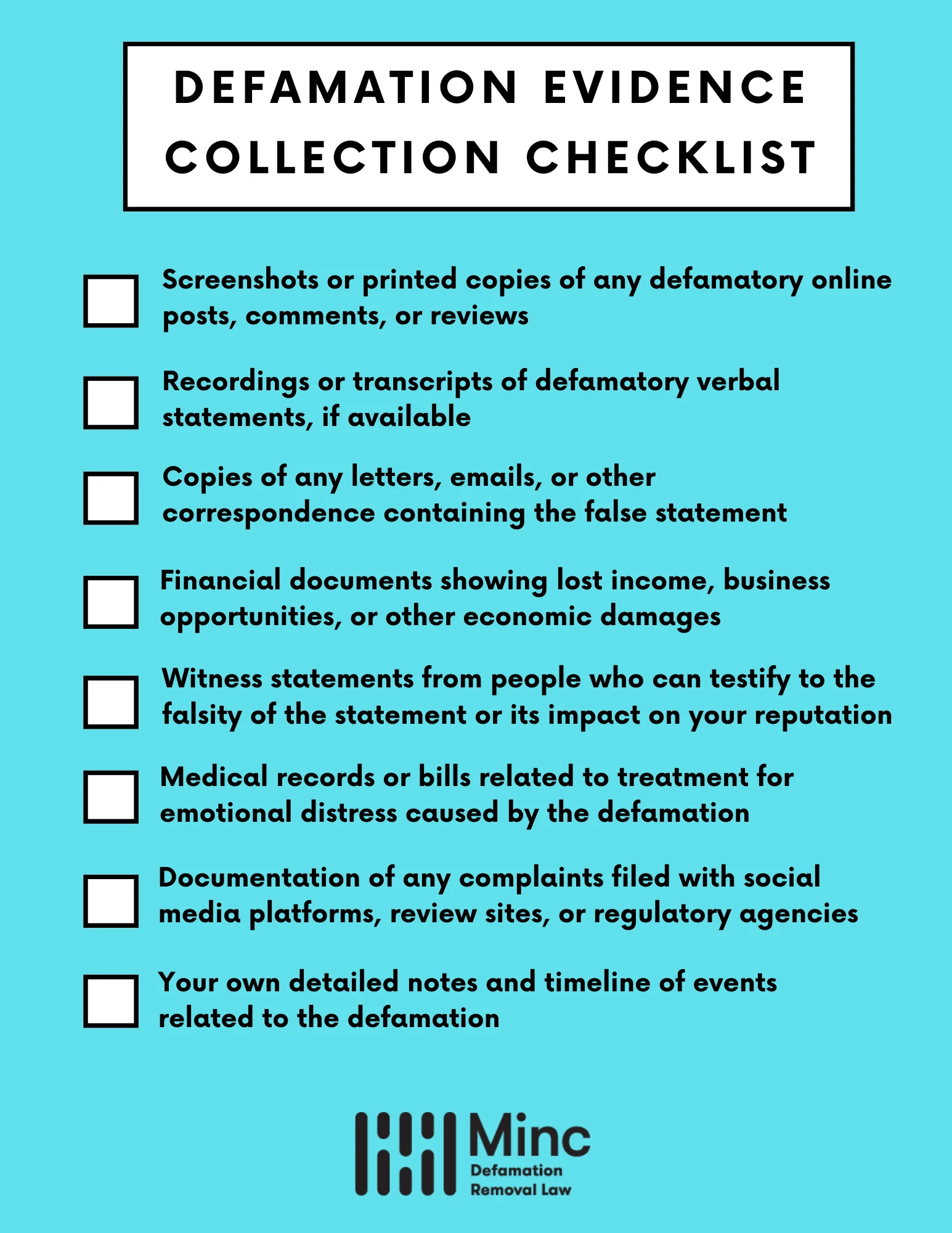
- Originally Published on July 3, 2024
How to Prove Defamation of Character in 5 Steps
If you’ve been the target of false and damaging statements, you may be wondering if you have a defamation claim. Defamation of character is a serious issue that can cause devastating personal and professional harm. But proving defamation requires establishing several specific legal elements based on the particular facts of each case.
In this guide, I’ll walk you through how to prove a claim for defamation and the steps to take if you’ve been defamed. As a defamation attorney, I’ve helped countless clients and prospective clients navigate this difficult but important decision. I’ll share examples, practical tips, and a printable evidence checklist to help you protect your reputation and get justice.
To prove defamation of character in court, you must establish the following 5 elements:
- The statement was false
- It was presented as a fact, not opinion
- It was published or shared with a third party
- The person making the statement was at least negligent
- You suffered harm to your reputation or livelihood as a result.
We will explain these elements in more detail in the following sections.
What is Defamation of Character? Defining Libel and Slander
Defamation of character occurs when someone makes a false statement of fact that harms another person’s reputation. The two main types of defamation are libel and slander. Libel refers to defamatory statements that are written or published, such as in a newspaper article, blog post, or social media comment. Slander refers to defamatory statements that are spoken, such as in a conversation, speech, or television interview.
Examples of defamatory statements in a personal context could include falsely accusing someone of having an infectious disease, being unfaithful to their spouse, or engaging in criminal activity. In a professional setting, defamatory statements might include falsely claiming a business owner engaged in fraud, an employee was fired for misconduct, or a service provider is unlicensed or unqualified.
It’s important to note that to be considered defamation, the statement must be false. True statements, even if they are damaging, are not defamation. Opinions are also protected by the First Amendment and cannot be defamatory in most circumstances. However, stating a negative opinion as if it were fact could cross the line into defamation.
The 5 Legal Elements You Must Prove in a Defamation Claim
To have a valid defamation claim, you must be able to prove the following five legal elements:
- False Statement of Fact
The statement made about you must be objectively false. It cannot be a true statement, no matter how damaging it may be to your reputation. The burden is on you as the plaintiff to prove the statement is false through evidence. - Publication
The false statement must have been published, meaning it was shared with at least one other person besides you and the person who made the statement. “Published” doesn’t necessarily mean in a newspaper or book – it can include statements shared verbally, in an email, text message, online post or comment, or written letter. - Identification
It must be reasonably understood that the defamatory statement is about you specifically. If your name is not directly used, you’ll need to show that people familiar with you could reasonably infer the statement was referring to you based on other identifying details or context. - Fault (Negligence or Actual Malice)
You must prove that the person making the defamatory statement did so either negligently or with actual malice. For private figures, the standard is typically negligence, meaning the person failed to take reasonable care to verify the truth before making the statement. For public figures, the standard is actual malice, meaning the person knew the statement was false when the statement was published or acted with reckless disregard for the truth of the statement published. - Damages
You must have suffered harm to your reputation, livelihood, or emotional well-being as a result of the defamatory statement. This could include things like losing your job, business opportunities, or relationships; experiencing public shame or ridicule; or suffering from anxiety, depression, or other emotional distress.
Establishing Falsity: Types of Evidence to Gather
The first element you must prove in a defamation claim is that the statement made about you is false. This requires gathering evidence to show the statement is objectively untrue. Some types of evidence that can help establish falsity include:
- Documents that contradict the statement, such as contracts, emails, or official records
- Witness testimony from people with direct knowledge that the statement is false
- Expert analysis, if applicable, such as a handwriting expert confirming a signature is forged or an accountant proving financial claims are false
- Evidence that the statement is physically or logically impossible based on verifiable facts
It’s important to gather as much concrete evidence as possible to prove the falsity of the statement. The more documentation and corroboration you have, the stronger your case will be.
Proving Publication: Who Shared the Defamatory Statement and How?
To prove defamation, you must show that the false statement was published to at least one other person besides you and the person who made the statement. There are many ways a statement can be “published,” including:
- Printed publications: This could include newspapers, magazines, books, brochures, or flyers containing the false statement.
- Online posts and comments: Defamatory statements are commonly shared on social media platforms, blogs, forums, and websites. This could include posts, comments, reviews, or online articles. Be sure to screenshot or print out online statements in case they are later deleted.
- Verbal comments: Defamatory statements can also be made in person or over the phone. Witness testimony from someone who heard the false statement can help prove publication.
- Letters, emails, and other correspondence: A defamatory statement shared in a written letter, email, or text message can also count as publication. Preserve copies of any correspondence containing the false statement.
The key is to gather evidence showing how the defamatory statement was shared and who received the communication. Proving widespread publication to many people can also help establish the extent of harm to your reputation.
Fault: What You Need to Show for Private vs. Public Figures
The standard for proving fault in a defamation claim depends on whether you are considered a private or public figure. Private figures only need to show that the person making the statement was negligent, while public figures must prove actual malice.
Negligence means the person did not exercise reasonable care to verify the truth of the statement before sharing it. For example, if someone tweeted a false rumor about you without making any effort to fact-check it first, that could be considered negligent.
Actual malice means the person either knew the statement was false or acted with reckless disregard for whether it was true or not. This is a higher standard that applies to public figures, like celebrities and politicians, as well as limited-purpose public figures who have voluntarily thrust themselves into the public spotlight on a particular issue. To prove actual malice, you typically need to show the person deliberately lied or entertained serious doubts about the truth of the statement.
Examples Of Evidence That Could Demonstrate Fault
- The person had reason to doubt the source of the information but shared it anyway
- The person had a history of making similar false statements showing a reckless disregard for the truth
- The person stood to benefit in some way from spreading the false statement
- Witness accounts of the person admitting they knew the statement was untrue
Proving fault can be challenging, but it’s essential to have evidence showing the person acted either negligently or with actual malice in sharing the defamatory statement.
Proving Damages: How to Show Harm to Your Reputation
To have a successful defamation claim, you must be able to show that the false statement caused you real harm. This harm can take several forms:
- Reputational damages: One of the most common types of harm in defamation cases is damage to your reputation. This could include losing the respect of your peers, being shunned or avoided socially, or having your character or integrity called into question. Evidence of reputational damages could include witness testimony from people in your community about how their perception of you changed after hearing the false statement.
- Lost business or job opportunities: If the defamatory statement caused you to lose clients, contracts, or job offers, this can be strong evidence of concrete financial harm. Gather any records showing a decline in business or lost opportunities, such as email exchanges with potential clients or employers who decided not to work with you after the statement was made.
- Mental anguish: Defamation can also cause significant emotional distress, such as anxiety, depression, shame, or humiliation. While this type of harm can be more difficult to quantify, medical records or testimony from a therapist can help establish the emotional impact of the false statement. Keep a journal documenting how the defamation has affected your mental well-being.
To prove damages, you’ll want to gather documentation of any financial losses or emotional distress you’ve experienced. This could include:
- Financial records showing a decline in business revenue or lost profits
- Emails or other correspondence showing lost job opportunities or client relationships
- Witness testimony from people who observed the impact on your reputation or mental state
- Medical bills or therapy records related to emotional distress caused by the defamation
Steps to Take If You’ve Been Defamed
If you believe you’ve been the victim of defamation, here are five key steps to take:
Document Everything
As soon as you discover the defamatory statement, start gathering evidence. Take screenshots of any online posts or comments, save copies of any publications or correspondence containing the false statement, and write down details of any verbal statements made (including who made the statement, when, where, and any witnesses present). Keep records of any negative impacts you experience, such as lost business or emotional distress.
File A Report With Social Media/Review Sites
If the defamatory statement was made on a social media platform or review site, flag it with the site’s moderation team and request that it be removed for violating community guidelines. Many sites have policies against harassment and false information and will remove defamatory content if reported.
Send A Cease And Desist Letter
If you know who made the defamatory statement, consider sending them a formal letter demanding that they retract the statement and stop making any further false claims. This shows that you are serious about defending your reputation and can sometimes resolve the issue without needing to go to court. Have a defamation attorney review the letter before sending it.
Consult An Attorney
Defamation law can be complex, so it’s important to consult with an experienced defamation attorney as soon as possible. They can help you evaluate the strength of your case, gather evidence, and develop a legal strategy for holding the defamer accountable and recovering damages.
Consider Alternatives to a Lawsuit
While filing a defamation lawsuit is one option for seeking justice, it’s not the only path forward. Your attorney may recommend sending a cease and desist letter first or exploring alternative dispute resolution options like mediation. In some cases, you may be able to reach a settlement agreement without going to trial. Keep an open mind and work with your attorney to determine the best approach for your unique situation.
Defamation Evidence Checklist
The more evidence you can compile, the stronger your defamation claim will be.

FAQs About Proving Defamation of Character
Is it Difficult to Prove Defamation?
Proving defamation can be challenging, as it requires evidence of false statements, negligence or malice, and damages. Gathering sufficient proof to satisfy all legal elements is often an uphill battle.
What If I Don’t Know Who Made The Defamatory Statement?
If the defamatory statement was made anonymously or by someone whose identity you don’t know, you may still be able to pursue a defamation claim. Your attorney can file a “John Doe” lawsuit and subpoena websites, internet service providers, or other third parties to try to uncover the identity of the defamer. This process can take time, but it is possible to hold anonymous defamers accountable.
Can I Sue For Defamation If The Statement Is True?
No, truth is an absolute defense to defamation. If the statement made about you is substantially true, even if it’s embarrassing or damaging to your reputation, it’s not considered defamation under the law. You can still pursue other legal remedies if the statement violates your privacy rights or if the way the information was obtained was illegal.
What If The Defamatory Statement Is An Opinion?
Opinions, however insulting, are protected by the First Amendment and cannot be defamatory. However, there’s a difference between a pure opinion and a “mixed opinion” that implies false facts. For example, saying “I think John is a terrible lawyer” is an opinion. But saying “I think John is a terrible lawyer because he’s been disbarred three times” is stating a verifiable fact that could be defamatory if untrue. The line between opinion and fact can be blurry, so consult with an attorney if you’re unsure.
How Much Money Can I Get In A Defamation Lawsuit?
The amount of damages you can recover in a defamation lawsuit depends on the specific facts of your case and the extent of harm you can prove. Compensatory damages may include lost wages, lost business opportunities, medical expenses related to emotional distress, and reputational damage. In some cases, punitive damages may also be available if the defamer acted with malice or fraud. Your attorney can give you a better sense of the potential value of your claim.
What If The Defamation Happened A Long Time Ago?
Every state has a statute of limitations that sets a deadline for filing a defamation lawsuit. The exact time limit varies by state, but most range from one to three years after the defamatory statement was made or discovered. If you wait too long to file a claim, you may lose your right to sue, so it’s important to consult with an attorney as soon as possible after discovering the defamation.
Proving Defamation: You’re Not Alone, We Can Help
If you’ve been defamed, I know how overwhelming and painful it feels. Proving defamation of character takes evidence, persistence, and skilled guidance. But you’re not alone. Our experienced team of defamation lawyers has helped countless clients stand up to defamers and win.
We’re here to listen to your story, advise you on your strongest legal options, and guide you through every step of the process. You don’t have to let the fear of a complex lawsuit stop you from getting justice.
You can rebuild your reputation and self-worth. If the facts are on your side, the law is, too. Contact us today for a confidential consultation and take the first step to proving defamation and reclaiming your good name.
Get Your Free Case Review
Fill out the form below, and our team will review your information to discuss the best options for your situation.
This page has been peer-reviewed, fact-checked, and edited by qualified attorneys to ensure substantive accuracy and coverage.


